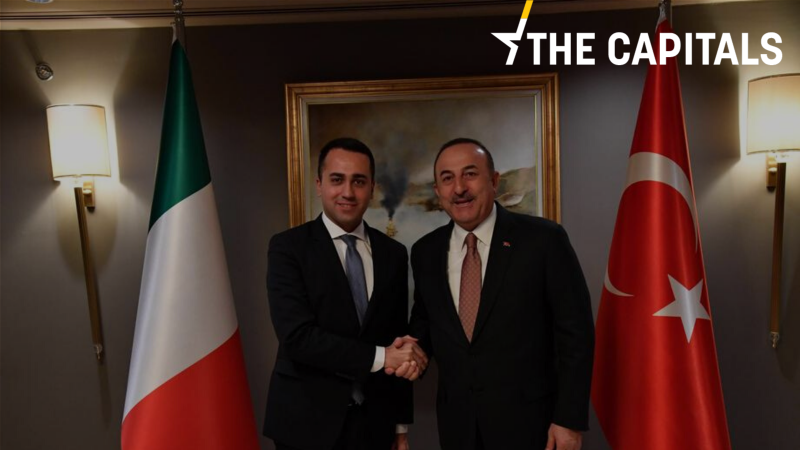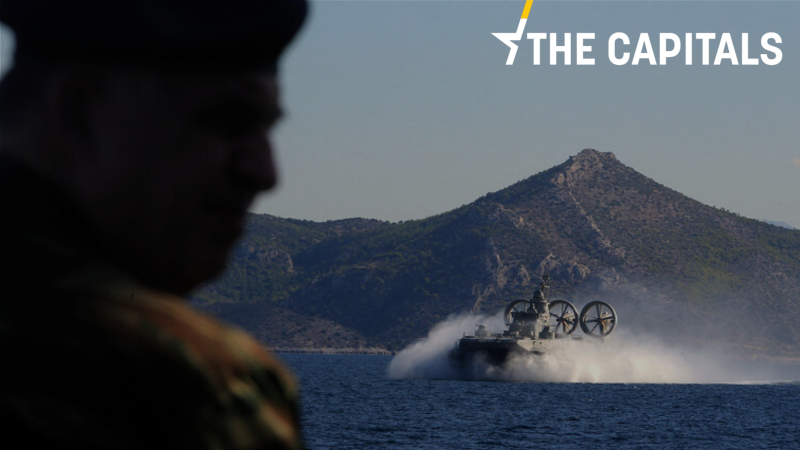
Before you start reading today’s edition of the Capitals, we invite you to read about Iran being ready to ‘stand down’ as Trump says, urging greater NATO involvement in the Middle East.
Also, feel free to have a look at the agriculture articles written by Natasha Foote:
- Collaborative initiative aims to improve sustainability of EU dairy farming
- UK Environment secretary: Brexit is opportunity for UK to ‘shake off shadow of CAP’
Read also Georgi Gotev’s report from Zagreb: “Croatia highlights its Schengen and Eurozone ambitions“.
The US could be seen as “neutral” mediator in the ongoing maritime disputes in the Eastern Mediterranean, Niklas Novaky, an analyst at the European People’s Party (EPP) think-tank Martens Centre, told EURACTIV.com.
“The US has a record of mediating maritime territorial disputes involving Greece and Turkey such as when American diplomats and the late Richard Holbrook in particular defused the 1996 Imia/Kardak crisis. The US should rediscover this role and help mediate the current territorial disputes in the eastern Mediterranean over the delineation of different littoral countries’ Exclusive Economic Zones,” he said.
“Given that the US is not an EU or Mediterranean littoral state itself, it could be seen as a more neutral mediator than the EU for example,” Novaky added.
Greek newspaper Kathimerini reports today that following the Greek PM Kyriakos Mitsotakis’s visit in the US, Washington is planning to take initiatives to de-escalate tensions in the region.
We also spoke with David McAllister, the president of the European Parliament’s foreign affairs committee.
EURACTIV’s Network Editor Sarantis Michalopoulos has the story.
///
ROME
Mediation to solve the Libyan crisis fails. After Italy called on states to gather around ‘the table’ to settle the Libyan crisis, it was stood up by the head of the UN-backed Government of National Accord (GNA), Faiez el-Serraj, who cancelled his Rome visit at the last minute after finding out that General Khalifa Haftar was having talks with PM Giuseppe Conte.
In Cairo, Italy’s Foreign Minister, Luigi Di Maio, also refused to sign a joint document between Egypt, France, Cyprus and Greece, describing it as “too harsh” on Turkey and the GNA.
Italy’s lack of success in gathering stakeholders around the same table, casts doubt on its prospects of successfully finding a solution to the Libya crisis?
EURACTIV’s Gerardo Fortuna reports.
///
BERLIN
Merkel says ‘Nein’ to cabinet reshuffle. In response to a suggestion to “rejuvenate and renew” the government made on Monday (6 January) by the head of the Christian Social Union (CSU) and Minister-President of Bavaria, Markus Söder, Chancellor Angela Merkel has declined to reshuffle her cabinet.
More from EURACTIV Germany’s Sarah Lawton.
///
VIENNA
Could the FPÖ make a comeback by re-branding? After a series of corruption scandals since May 2018, which culminated into the collapse of the ÖVP-FPÖ coalition led by still-Chancellor Sebastian Kurz, the right-wing populist party held a meeting to kick-start the party’s rebranding process on Wednesday (8 January).
But could the scandal-ridden party still become a “modern right-wing conservative party”, as announced by party leader Norbert Hofer?
EURACTIV Germany’s Philipp Grüll has more.
///
STOCKHOLM
Farewell to fossil fuels? In a move that is described “unique”, Sweden is positioning itself at the forefront in the fight against climate change. A fossil-free future is set as a target not only in Sweden, but also in the rest of the European Union.
Pekka Vänttinen has the story.
///
PARIS
France’s addiction to pesticides. The French government released official figures on Wednesday (8 January) confirming that pesticide use saw a dramatic 24% increase from 2017 to 2018. This comes as a shock given the government’s efforts to reduce the spraying of weedkillers through its Ecophyto plan, which aims for a 25% reduction by 2020, as well as a 50% reduction by 2025.
Read more (EURACTIV.fr)
>>Read also: Future of France’s organic products may lie in hands of large supermarkets
///
MADRID
A Spanish ‘bromance’. Last September, Spanish prime minister Pedro Sanchez said he couldn’t “sleep peacefully” if he had to form a government with Podemos leader Pablo Iglesias. The Socialist prime minister and the left-wing leader not only forged this week the first coalition government since the II Republic in the 30s, but they also cemented strong ties to ensure co-ordination within the government and among their parliamentary groups, according to a document signed on Wednesday.
Jorge Valero explains.
///
LONDON
Child refugee rights cut from Brexit bill. UK lawmakers on Wednesday (8 January) rejected proposals to keep protections for child refugees in the redrafted EU withdrawal agreement bill.
The provision to guarantee the right of unaccompanied child refugees to be reunited with family members living in the UK had been included in the Brexit bill agreed by Theresa May but was removed by her successor Boris Johnson following his decisive win in December’s general election. The bill will formally pass the House of Commons on Thursday and be sent to the House of Lords the following day. (Benjamin Fox, EURACTIV.com)
///
BRUSSELS
Decision on IS returnees. Belgium will not appeal against a national court ruling on making it possible for several Belgian IS fighters’ children to return from Syria, foreign affairs minister Philippe Goffin (MR) told the parliament’s Foreign Affairs Committee. The children are currently staying in the Al-Hol refugee camp, together with their mothers, who, according to the judge, have no right to consular assistance or documents.
As Belgium refuses to recover adult IS fighters, the biggest obstacle will be to get parental consent to let the children leave without them.
More detail courtesy of Alexandra Brzozowski.
///
DUBLIN
Varadkar-Martin talks. Taoiseach Leo Varadkar and Fianna Fáil leader Micheál Martin will sit down for talks this evening (9 January), in a bid to thrash out an agreement on a date for the Irish general election. The Irish PM has said that he would like to see the national ballot take place in 2020, whereas Martin would prefer an election around Easter time.
EURACTIV’s Samuel Stolton explains.
///
WARSAW | BUDAPEST
Speaker of the Senate, Tomasz Grodzki, met with EU Commission VP for Values and Transparency, Věra Jourová, as well as with EU Justice Commissioner Didier Reynders. The trio talked about the Polish government’s judicial reforms and focused on Poland’s bill, which is currently being reviewed by the Commission for allegedly undermining the independence of the judiciary.
In response to the Brussels visit, the ruling conservative Law and Justice (PiS) party has criticised Grodzki, who has been subjected to a smear campaign from state-controlled TV and PiS.
Also see here what’s happening with the troops of Poland and Hungary in Iraq.
(Łukasz Gadzała | EURACTIV.pl, (Vlagyiszlav Makszimov | EURACTIV.com)
///
GAS DEVELOPMENTS
BELGRADE
TurkStream to pay off in 10 to 12 Years. Serbian President Aleksandar Vučić said Serbia could expect a return on its investment into the TurkStream in 10 to 12 years. After the opening of the natural gas pipeline in Istanbul, Vučić said the project would provide a considerable boost to Serbia’s industry and economy, together with energy security and cheaper fuel.
EURACTIV Serbia reports.
///
Sofia enters the Greek FSRU. BULGARTRANSGAZ, under the approval of Council of Ministers of the Bulgarian Government, signed a document confirming its 20% share in the capital of GASTRADE S.A, the developer of the LNG Terminal in Northern Greece off the shore of Alexandroupolis.
The Alexandroupolis FSRU is a Project of European Common Interest but also a priority of US foreign policy, as it considered crucial for the diversification of gas sources, especially since Egypt will turn natural gas to LNG from Eastern Mediterranean fields for transportation to the EU. The LNG Terminal in Northern Greece is expected to start operations in 2022.
Here’s the take of EURACTIV Greece’s Theodore Karaoulanis.
///
SOFIA
Gas from Russia and the US. Although Bulgarian PM Boyko Borissov continues to deny that the US is pressuring him to terminate the “Balkan Stream” project, which plans to transport Russian gas to Europe as an extension of the Turkish Stream pipeline, he has announced his country’s intention to buy liquefied natural gas (LNG) from US companies, as well as a 20% stake in the Greek LNG terminal in Alexandroupolis. Read more here (EURACTIV.bg, Krassen Nikolov)
In addition, a High-Level Strategic Dialogue with the US omits role of media and civil society in Bulgaria. Dnevnik.bg reports.
///
PRAGUE
Czechs trust Putin. With 33%, Russian President Vladimir Putin is the most trusted world leader among Czechs, according to Pew Research Centre. French President Emmanuel Macron (30%), US President Donald Trump (28%) and German Chancellor Angela Merkel (25%) follow suit. (Aneta Zachová | EURACTIV.cz)
///
BRATISLAVA
Slovakia’s biggest problems. Living standards, corruption and healthcare are the three most frequent causes for frustration among Slovak citizens, followed by unemployment or deteriorating political culture. This is according to an opinion poll conducted for Transparency International Slovensko. (Zuzana Gabrižová | EURACTIV.sk)
///
ZAGREB
Mass exodus: an existential threat for new member states. “Every year, Croatia loses 15,000 people, which is comparable to one middle-sized town in our country,” PM Andrej Plenković told the French press during his official visit to Paris, emphasising that the problem is most prevalent in eastern regions where populists get more votes.
However, he rejected the idea that freedom of movement should be restricted in response, as it would compromise the EU project and “new member states should continue using EU funds to narrow the social gap with more developed countries”. (Tea Trubić Macan | EURACTIV.hr)
[Edited by Sarantis Michalopoulos, Daniel Eck, Benjamin Fox]






Komentari
0